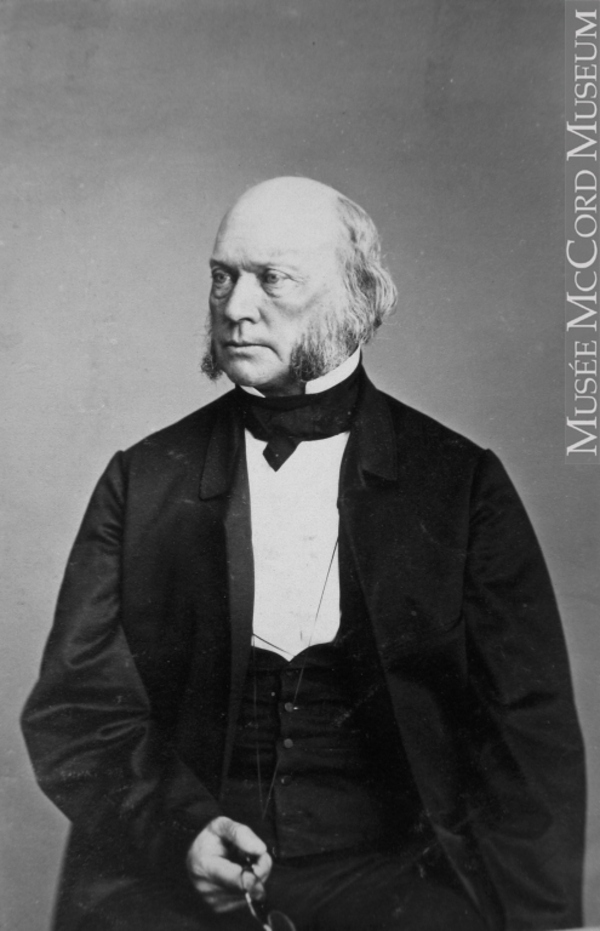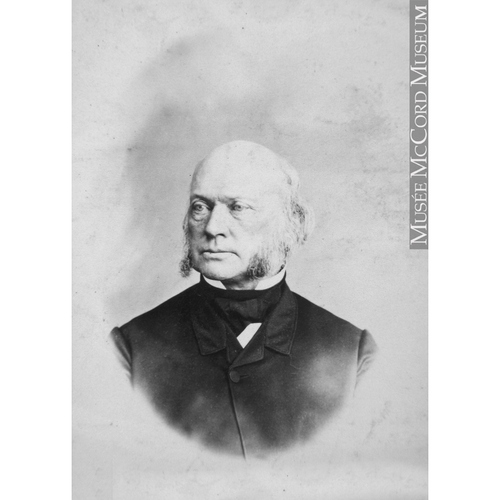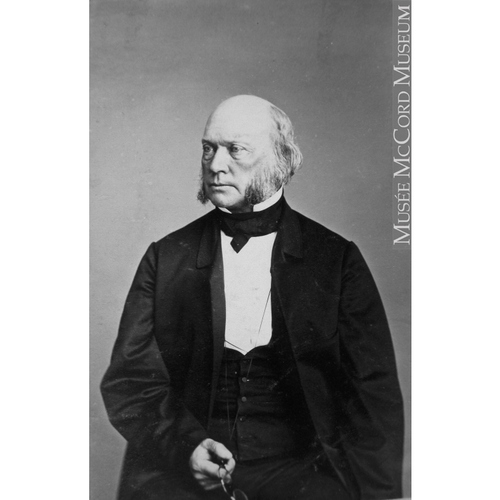As part of the funding agreement between the Dictionary of Canadian Biography and the Canadian Museum of History, we invite readers to take part in a short survey.

Source: Link
CAYLEY, WILLIAM, lawyer and politician; b. 26 May 1807 at St Petersburg, Russia, second son of John Cayley, British consul and merchant, and his second wife, Harriet Raikes; m. 12 April 1836 Emma Robinson, daughter of D’Arcy Boulton*, and they had 11 children; d. 23 Feb. 1890 at Toronto, Ont.
William Cayley completed his education in England. He entered Christ Church, Oxford, in 1826 and graduated with a ba in 1830. He obtained an ma in 1833 and was called to the bar from Lincoln’s Inn in 1835. Some time between 1835 and 1838 he immigrated to Upper Canada, and was admitted as a barrister to the Law Society of Upper Canada during the Easter term in 1838. He was to practise law in Toronto at various times over the next 30 years when not holding public office. In 1850 he was in a partnership with Matthew Crooks Cameron; Daniel McMichael later joined the firm. The Toronto city directory of 1862–63 lists him as a barrister in partnership with Cameron and McMichael. In 1864–65 he disappears from the city listings but he reappears as clerk of the surrogate court in 1866.
Connected by marriage to the Boultons, a prominent Tory family, Cayley was chosen on 6 Aug. 1845 by William Henry Draper* to succeed William Benjamin Robinson* on the Executive Council as inspector general. A safe seat in the Legislative Assembly was opened for him in the constituency of Huron for which he was returned on 28 Feb. 1846. In the ensuing decade Cayley was viewed by Tory leaders as a loyal and trustworthy associate specializing in public finance. When he took up office, heavy expenditures on public works and unexpected expenses incurred as a result of the Irish famine immigration brought major problems for Cayley, who at the same time had to raise funds on a sluggish money market. One recourse was to sell British consols, in which funds from the clergy reserves were invested, and replace them with Canadian government debentures. Cayley’s personality marked him more as a hard-working lieutenant than a party leader, yet he was high in the Tory party councils in the late 1840s, conducted the negotiations in April 1847 with René-Édouard Caron* seeking to enlarge the French Canadian wing of the ministry, and journeyed to England with Sir Allan Napier MacNab* in 1849–50 to lobby against the policies of the governor, Lord Elgin [Bruce*]. In 1849 Elgin referred to “Cayley & Co” in describing the Tory party.
In the general election of 1847–48 Cayley retained his seat for Huron, but went out of office on 10 March 1848 with the defeat of the Tory ministry. He was in the front bench of the opposition and led the fight against the government’s proposed clergy reserve settlement. He favoured the implementation of the provisions of the imperial statute of 1841 whereby the share of the income not allotted to the Church of England would be divided proportionately among the Roman Catholic, Presbyterian, and other Christian bodies. He was out of the assembly for one term following his defeat by Malcolm Cameron* in the election of December 1851.
Returned for Huron and Bruce in 1854 he once more became inspector general on 11 September in the ministry of MacNab and Augustin-Norbert Morin*, as well as a member of the Board of Railway Commissioners. Although defeated in the general election of 1857, he held these offices until August 1858. From 3 Nov. 1854 until 28 July 1857 he was the government director on the Grand Trunk Railway Company board. In 1854–55, when a committee of the house led by William Lyon Mackenzie* launched a strong attack condemning the accounting methods of government departments, Cayley, at the prompting of John A. Macdonald* who was attorney general for Canada West, brought in the Audit Act of 1855. This legislation was a landmark in Canadian public administration because it created a new office, auditor of public accounts, and a new department of government, the Audit Board. In 1857 a bill made the use of the decimal currency mandatory in all government accounts after 1 Jan. 1858. Cayley’s 1857 budget, which Alexander Tilloch Galt* saw through the house in 1858, increased significantly the level of customs duties on selected items and earned for Cayley the reputation of initiating a protectionist policy in Canada.
Policies which had been inaugurated by Francis Hincks before Cayley’s return to office in 1854 were to result in important activities during his term. In three years of economic prosperity, 1854–56, a number of new banks were chartered, towns were enabled to borrow heavily through the Municipal Loan Fund, and large capital grants were made to the Grand Trunk and the Bank of Upper Canada. Cayley, who was described by a contemporary as “too timid a hand for any efficient reform,” did little either to police the trend towards large increases in government spending or to control other inflationary influences in the economy. When the onset of a sharp recession in 1857 contracted the world’s money market, Canadian land values fell disastrously, banks were hard pressed to maintain liquidity [see Robert Cassels], and government revenues shrank dramatically.
Once Cayley lost his seat in the general election of 1857 his usefulness to the government was ended. During the ministerial crisis of 1858 he was replaced in the Executive Council by Galt as inspector general and by George Sherwood as representative of the Toronto Conservatives in the reconstructed government of George-Étienne Cartier* and Macdonald. Cayley had, however, been returned for Renfrew in a March 1858 by-election, and sat for that riding until he retired from politics in 1861.
Cayley had been associated as director with the Bank of Upper Canada from at least 1839, but when he joined the bank as assistant manager in 1859 he wrote to George Cain Glyn of Glyn, Mills and Company that he was “as little prepared as the gardeners for the frost of Saturday last.” His promotion within the bank, however, was rapid; he was appointed inspector (manager of agencies) and then, at a board meeting on 17 April 1861, he replaced William Proudfoot* as president. His banking career came to an abrupt end at the annual general meeting of 25 June 1861. Angry shareholders were beginning to realize the full extent of the bank’s financial difficulties and neither Cayley nor Proudfoot was re-elected as director. When the bank failed in 1866 Cayley presumably suffered significant personal losses. A group of businessmen including Cayley, Angus Morrison, Joseph Curran Morrison, and Frederic William Cumberland, had obtained a charter for a Bank of Canada in 1858 but it was never acted upon and was purchased by William McMaster, president of the Canadian Bank of Commerce, in 1866. From 1866 to 1869 Cayley was clerk of the surrogate court for York County. Perhaps because of his involvement with the Audit Act he was appointed auditor of the province of Ontario in 1870 and continued in that office until 1877.
Cayley was an adherent of the Church of England but he could show independence. In 1860, for instance, as a member of a select committee named by parliament he joined George Brown* in defending the non-sectarian position of the University of Toronto in opposition to the stand taken by John A. Macdonald and Malcolm Cameron. He was an amateur painter and a president of the Toronto Club and the Toronto Curling Club. In politics his intense partisanship earned the enmity of Reformers. Lord Elgin felt Cayley “well qualified to give a cause any gloss that may suit his interests.” Macdonald explained to a colleague, “There is an opinion very prevalent . . . that he is insincere & scheming. This arises altogether from his manner, which he is conscious of but cannot amend. . . . his merits far outweigh his faults.” For Macdonald, “trustworthiness & ability as a Statesman” were Cayley’s chief attributes and for many years he relied on his judgement and administrative ability in framing and implementing public financial policy.
William Cayley was the author of Finances and trade of Canada at the beginning of the year 1855 (London, 1855). See also Correspondence between the Hon. Wm. Napier, on behalf of the English shareholders of the Grand Trunk Railroad Company, and the Honble. Wm. Cayley (inspector general) . . . (Toronto, 1856).
AO, MU 500–15; RG 1, A-I-6, 31. MTL, Robert Baldwin papers, 35, no.107; 39, no.73; 50, no.89; 55, no.46; 64, no.24; 74, no.53. PAC, MG 24, D36. Elgin-Grey papers (Doughty). [John Langton], Early days in Upper Canada: letters of John Langton from the backwoods of Upper Canada and the Audit Office of the province of Canada, ed. W. A. Langton (Toronto, 1926). Macdonald, Letters (J. K. Johnson and Stelmack), I, II. Toronto Daily Mail, 24, 27 Feb. 1890. [J.] B. Burke, A genealogical and heraldic history of the colonial gentry (2v., London, 1891–95), II: 750–53. Canada, an encyclopædia (Hopkins), I: 493. Chadwick, Ontarian families, I: 51–54. Toronto directory, 1843–70. Wallace, Macmillan dict. Canada and its prov. (Shortt and Doughty), V: 277–83, 288–91; IX: 133; XVIII: 448–49. Careless, Brown. Cornell, Alignment of political groups. Creighton, Macdonald, young politician. Joseph Pope, Memoirs of the Right Honourable Sir John Alexander Macdonald, G.C.B., first prime minister of the dominion of Canada (rev. ed., Toronto, 1930). Edward Porritt, Sixty years of protection in Canada, 1846–1907, where industry leans on the politician (London, 1908). D. F. Barnett, “The Galt tariff: incidental or effective protection?” Canadian Journal of Economics (Toronto), 9 (1976): 389–407. Peter Baskerville, “Donald Bethune’s steamboat business: a study of Upper Canadian commercial and financial practice,” OH, 67 (1975): 135–49. “Glyns and the Bank of Upper Canada,” Three Banks Rev. (Edinburgh), 55 (September 1962): 40–52. George Metcalf, “Draper conservatism and responsible government in the Canadas, 1836–1847,” CHR, 42 (1961): 300–24. Shortt, “Hist. of Canadian currency, banking and exchange,” Canadian Banker, 10–13.
Cite This Article
Paul G. Cornell, “CAYLEY, WILLIAM,” in Dictionary of Canadian Biography, vol. 11, University of Toronto/Université Laval, 2003–, accessed March 29, 2025, https://www.biographi.ca/en/bio/cayley_william_11E.html.
The citation above shows the format for footnotes and endnotes according to the Chicago manual of style (16th edition). Information to be used in other citation formats:
| Permalink: | https://www.biographi.ca/en/bio/cayley_william_11E.html |
| Author of Article: | Paul G. Cornell |
| Title of Article: | CAYLEY, WILLIAM |
| Publication Name: | Dictionary of Canadian Biography, vol. 11 |
| Publisher: | University of Toronto/Université Laval |
| Year of publication: | 1982 |
| Year of revision: | 2021 |
| Access Date: | March 29, 2025 |




